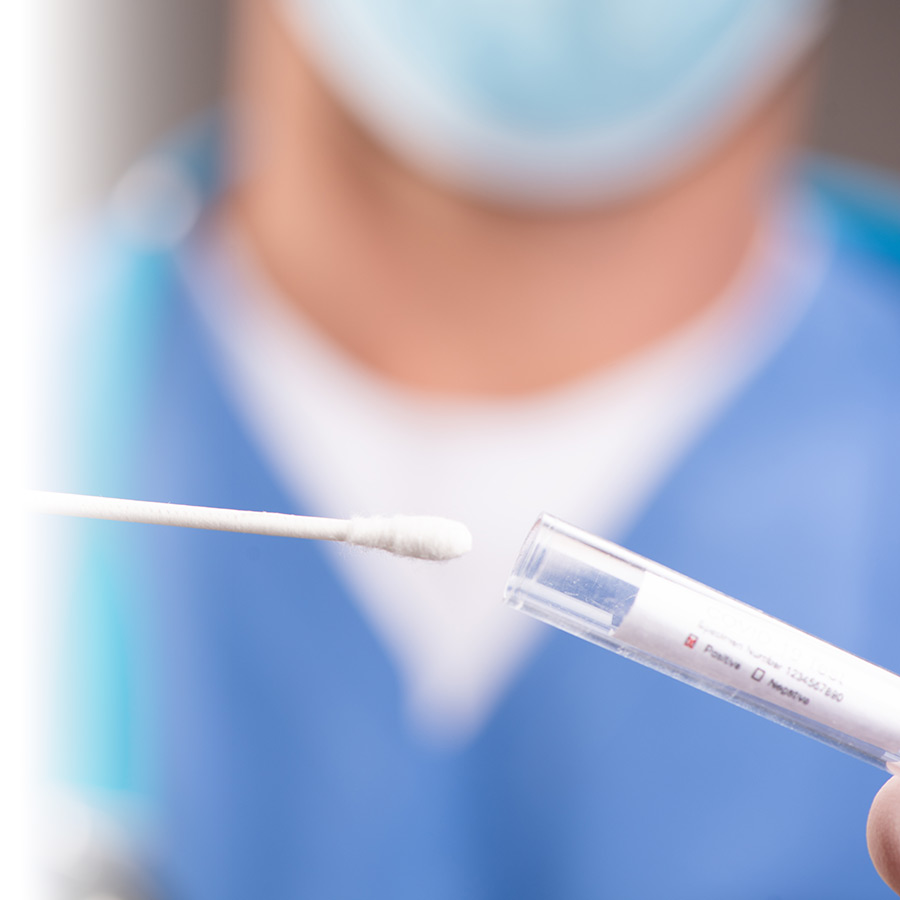COVID-19 screening tests are one of the tools that can be used to limit the spread of the virus. Using them properly can prevent unintentional transmission of the virus.
COVID-19: A SOMETIMES HIDDEN INFECTION
COVID-19 is not always easy to detect. It is estimated that roughly 15% to 30% of people infected with the coronavirus (SARS-CoV-2) do not experience any symptoms. However, they can still spread the virus. Additionally, the most common symptoms (cough, fever, headache, muscle aches, chills) are similar to those of other illnesses such as the flu or the common cold. Therefore, it is easy to have COVID-19 without knowing it.
Symptoms usually appear 3 to 7 days after having been infected (in some cases, 1 to 14 days). As a result, an individual can be contagious and spread the virus even before showing symptoms.
When should a test be performed?
If you have symptoms similar to those of COVID-19, it is recommended to conduct a screening test. You may also want to perform a test if you have been in close contact with someone who has tested positive for COVID-19, even if you have not developed symptoms.
There are two main types of screening tests: PCR tests (molecular detection of SARS-CoV-2 genetic material) and antigenic or “rapid” tests (detection of SARS-CoV-2 proteins).There are two main types of screening tests: PCR tests (molecular detection of SARS-CoV-2 genetic material) and antigenic or “rapid” tests (detection of SARS-CoV-2 proteins).
PCR TESTS
PCR tests are very sensitive and can detect the presence of the virus and therefore confirm the diagnosis of COVID-19 from the very beginning of the infection. Some of them can also identify the presence of other respiratory microbes, such as influenza. These tests must be analyzed in a designated laboratory, as they require sophisticated equipment and medical expertise.
Some PCR tests involve taking a sample from inside the nose or throat. Others use a saliva specimen (spitting into a tube) or a gargle method, but are less reliable than nasopharyngeal swabs. Results are usually obtained within 24 to 48 hours.
PCR screening tests for COVID-19 are performed at local points of service and are available for specific populations:
- healthcare workers
- people with COVID-19 symptoms who can benefit from treatment against COVID-19 (e.g., PaxlovidTM)
- people who have a referral by a healthcare professional to be screened prior to a medical procedure or treatment.
RAPID (ANTIGENIC) TESTS
The main advantages of rapid tests are that they are easy to use and provide a rapid result. However, they are less sensitive than PCR tests: their ability to detect small amounts of virus is lower. The results of rapid tests must therefore be interpreted with more caution to avoid the impression of safety when the person is actually infected (false negative).
That said, the use of rapid tests remains useful in several contexts, particularly for use at home when a result is needed quickly or for frequent testing, or when PCR tests are not accessible. For the time being, rapid tests are the tests used by the majority of the population.
WHAT SHOULD BE DONE BASED ON TEST RESULTS?
If you obtain a positive result from a screening test:
- Consult your pharmacist. In addition to advising you on how to manage your symptoms, your pharmacist will assess whether you are one of the vulnerable persons who can receive treatment against COVID-19 (PaxlovidTM). If so, they can prescribe it for you.
- Avoid contact with other people and public places for 10 days following your test, or until you have tested negative.
- If certain essential outings, such as grocery shopping, cannot be avoided or delegated, wearing a mask is recommended.
- Make a note of the date of your positive test, as this will be useful for your next dose of COVID-19 vaccination.
HOW CAN RAPID TESTS BE OBTAINED?
Rapid tests provided free of charge by the government are available in pharmacies for certain people, such as vulnerable persons for whom treatment against COVID-19 is being considered, or people benefiting from free medication under the Public Prescription Drug Insurance Plan. Ask your pharmacist to find out if you fall into one of these groups. If not, over-the-counter rapid tests are available in pharmacies if you are not among those eligible to receive them free of charge.
Rapid tests are also distributed free of charge at certain local points of service, such as vaccination centres, schools and certain businesses.
Don’t hesitate to speak to your pharmacist for additional information about COVID-19 testing.


